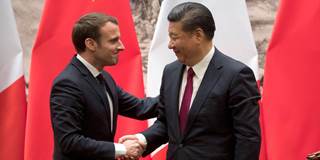As faith in US leadership declines, so may other countries’ commitment to international cooperation – trends that could culminate in an economic race to the bottom or even violent conflict. But another way already seems to be emerging, based on new coalitions, as well as updated global institutions, spearheaded by more diverse actors.
OXFORD – After decades of serving as the backbone of a rules-based global order, the United States, under President Donald Trump, is touting an “America First” agenda that extols narrow economic nationalism and distrust of international institutions and agreements. But a new type of international cooperation may be emerging – one that works around Trump.
To be sure, as the Trump administration continues to repudiate long-established patterns of cooperation, the risk to global stability is becoming increasingly acute. For example, at the World Economic Forum’s annual meeting in Davos last month, US Secretary of the Treasury Steven Mnuchin spoke positively about a weaker dollar as a way to boost US trade.
For a country that relies on foreign demand for strong dollars and Treasuries to finance its rapidly expanding deficit, this is a foolhardy perspective. Moreover, it amounts to a betrayal of the longstanding US commitment to uphold a rules-based monetary system that discourages competitive currency devaluation.

OXFORD – After decades of serving as the backbone of a rules-based global order, the United States, under President Donald Trump, is touting an “America First” agenda that extols narrow economic nationalism and distrust of international institutions and agreements. But a new type of international cooperation may be emerging – one that works around Trump.
To be sure, as the Trump administration continues to repudiate long-established patterns of cooperation, the risk to global stability is becoming increasingly acute. For example, at the World Economic Forum’s annual meeting in Davos last month, US Secretary of the Treasury Steven Mnuchin spoke positively about a weaker dollar as a way to boost US trade.
For a country that relies on foreign demand for strong dollars and Treasuries to finance its rapidly expanding deficit, this is a foolhardy perspective. Moreover, it amounts to a betrayal of the longstanding US commitment to uphold a rules-based monetary system that discourages competitive currency devaluation.